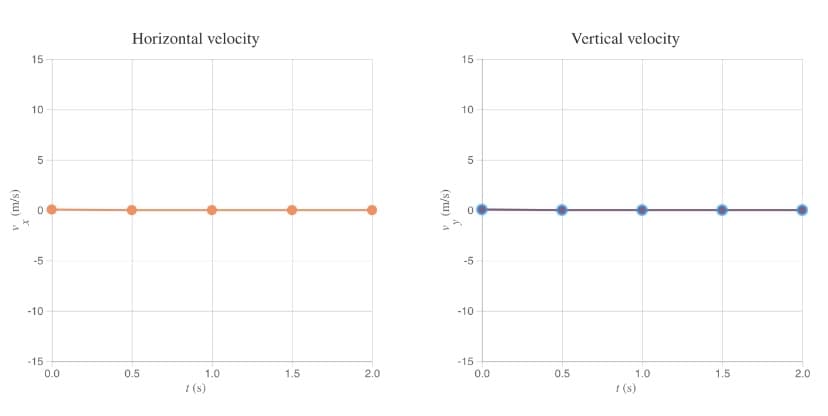Emmy kicks a soccer ball up at an angle of 45" over a level field. She watches the ball's trajectory and notices that it lands, two seconds after being kicked, about 20 m away to the north. Assume that air resistance is negligible, and plot the horizon and vertical components of the ball's velocity as a function of time. Consider only the time that the ball is in the air, after being kicked but before landing. Take "north" and "up" as the positive x- and y-directions, respectively, and use g z 10 m/s for the downward acceleration due to gravity.
Emmy kicks a soccer ball up at an angle of 45" over a level field. She watches the ball's trajectory and notices that it lands, two seconds after being kicked, about 20 m away to the north. Assume that air resistance is negligible, and plot the horizon and vertical components of the ball's velocity as a function of time. Consider only the time that the ball is in the air, after being kicked but before landing. Take "north" and "up" as the positive x- and y-directions, respectively, and use g z 10 m/s for the downward acceleration due to gravity.
University Physics Volume 1
18th Edition
ISBN:9781938168277
Author:William Moebs, Samuel J. Ling, Jeff Sanny
Publisher:William Moebs, Samuel J. Ling, Jeff Sanny
Chapter4: Motion In Two And Three Dimensions
Section: Chapter Questions
Problem 56P: Olympus Mons on Mars is the largest volcano in the solar system, at a height of 25 km and with a...
Related questions
Concept explainers
Topic Video
Question

Transcribed Image Text:Emmy kicks a soccer ball up at an angle of 45° over a level field. She watches the ball's trajectory and notices that it lands,
two seconds after being kicked, about 20 m away to the north. Assume that air resistance is negligible, and plot the horizonta
and vertical components of the ball's velocity as a function of time. Consider only the time that the ball is in the air, after
being kicked but before landing. Take "north" and "up" as the positive x- and y-directions, respectively, and use g z 10 m/s
for the downward acceleration due to gravity.

Transcribed Image Text:Horizontal velocity
Vertical velocity
15
15
10
10
-5
-5
-10
-10
-15
-15
0.0
0.5
1.0
1.5
2.0
0.0
0.5
1.0
1.5
2.0
t (s)
t (s)
(s/u) A
(s/u) A
Expert Solution
This question has been solved!
Explore an expertly crafted, step-by-step solution for a thorough understanding of key concepts.
This is a popular solution!
Trending now
This is a popular solution!
Step by step
Solved in 3 steps with 1 images

Knowledge Booster
Learn more about
Need a deep-dive on the concept behind this application? Look no further. Learn more about this topic, physics and related others by exploring similar questions and additional content below.Recommended textbooks for you

University Physics Volume 1
Physics
ISBN:
9781938168277
Author:
William Moebs, Samuel J. Ling, Jeff Sanny
Publisher:
OpenStax - Rice University

University Physics Volume 1
Physics
ISBN:
9781938168277
Author:
William Moebs, Samuel J. Ling, Jeff Sanny
Publisher:
OpenStax - Rice University